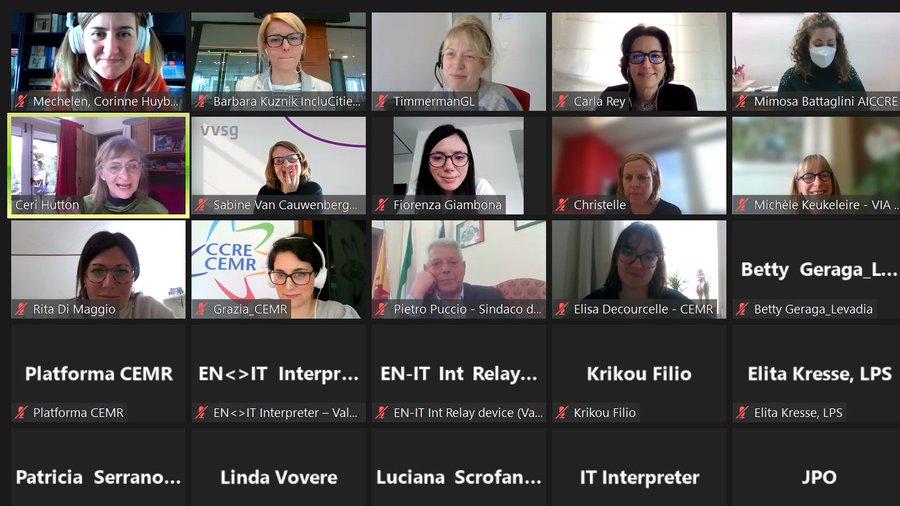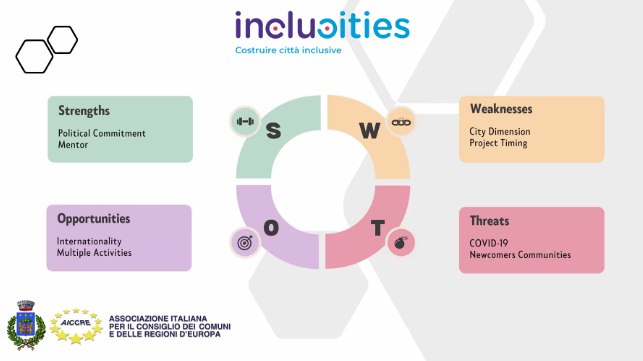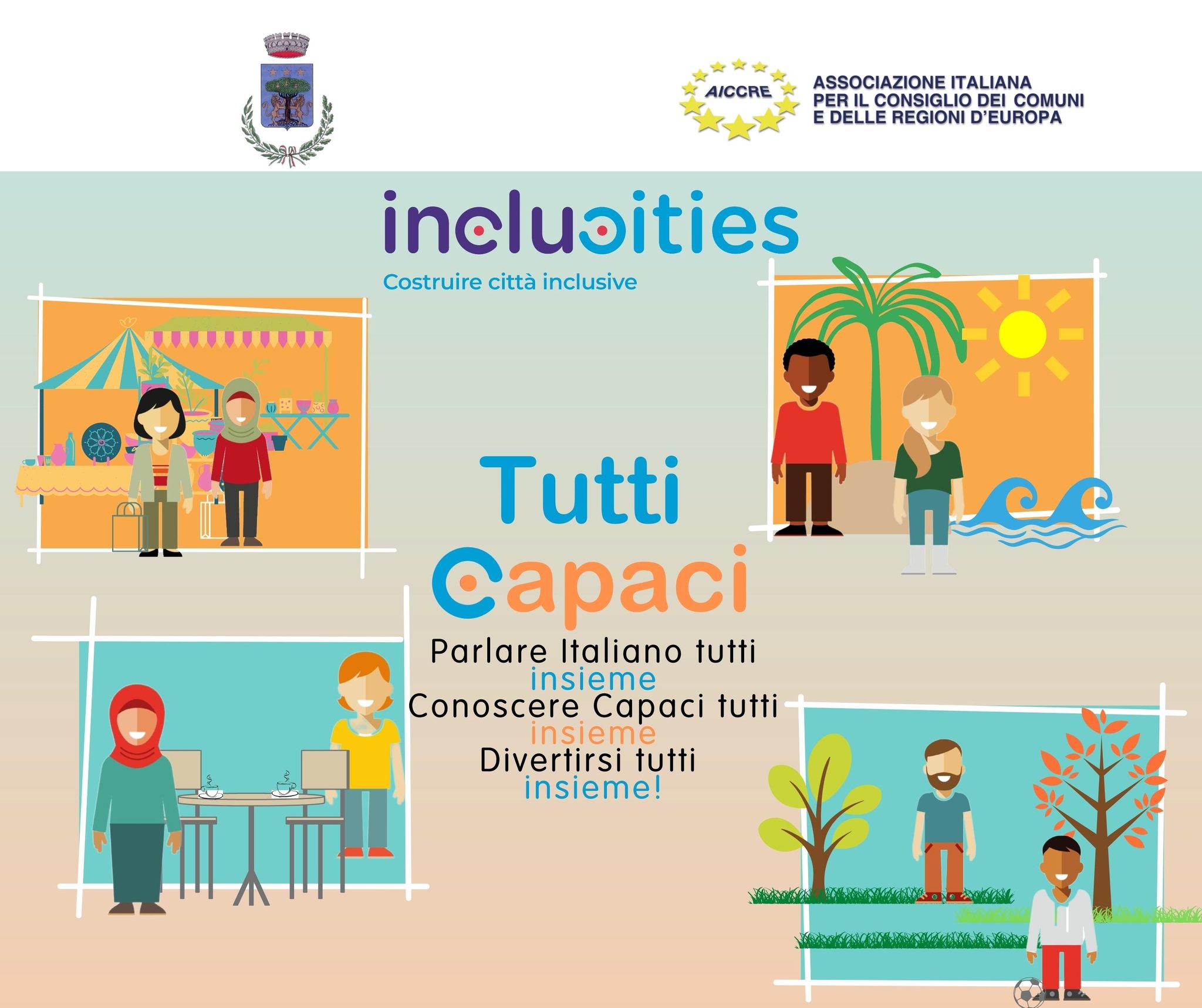"Tutti Capaci" - We can do it. Together!
Capaci (AICCRE) & Mechelen (VVSG)
The transfer workshops are the project's internal sessions, where individual mentoring pairs share the state of play and their concrete action plans with other partners. It's a valuable opportunity to learn from each other and exchange knowledge and experience by taking stock of the work done so far. This cross-over exercise enabled the IncluCities mentoring pair to get insights and inspiration from the associations and all eight cities in a supportive and collaborative way.

Durmish Guri highlighted in his welcome speech the importance of such exchanges for partners as well as for CEMR. These workshops happen at a turning point of the project and allow us to learn from each other, to exchange best practices and lessons learned.
Focused on very concrete steps in implementing a project equivalent to the Buddies with Refugees in Mechelen, Capaci described how they identified the target groups, topics, and monitoring methodology. Giving the background about the current situation and history of this Sicilian city, they also outlined the importance of the action plan for the larger Italian territory. An interesting detail is that part of the process also named the action "Tutti Capaci', which we could translate as "We can do it". They also found the adequate word for buddies, 'compa' from the word compare, which means a fellow /a peer in the Sicilian dialect.
Recap on the context of Capaci and challenges to be tackled
Pietro Puccio, Mayor of Capaci, explained that Capaci is a migration city. First, many people emigrated from Capaci to all over Europe or the US. Today, Capaci is welcoming many migrants. Sicilians are used to welcoming migrants from Italy: foreigners are not seen as “people from outside”. Since the beginning of the 90’, non-Europeans have been moving to Sicily and Capaci, and there was fear at the beginning. Today, Pietro Puccio wants Capaci to be a multicultural city again and that all the people who live there are part of the city. It is a place for everyone, which explains their willingness to join IncluCities Project.
"Capaci has always been an immigration town, and each foreigner has been seen as one of us. We want to bring this sentiment back and build a welcoming city for all", said Mayor of Capaci Pietro Puccio.
Carla Rey, Secretary-General of AICCRE explained that from their point of view, this project is a huge opportunity, firstly because Italy faced a lot of immigration, and moreover because Sicily is the hot spot for immigration. There are 8000 small and medium-sized municipalities in Italy. This project allows Capaci and AICCRE to demonstrate that action can be undertaken at this level of governance and that the eligibility, in this kind of project, of the small municipality is necessary. The value of this project is that Capaci is a pilot city. AICCRE would like to replicate the action plan and its success in many other parts of the country and many other cities. The national government is interested in this project (they met with the ministry of interior). Carla Rey further highlighted that the project is also good for Capaci and its capacity for project management: they hope to transform the city into a symbol of a welcoming and inclusive city.
The mentoring process so far and the challenges encountered
Ceri Hutton, the facilitator from Migration Work, explained that this is a really exciting pairing with enthusiastic participants. From the beginning, Capaci was really ambitious. Through the work with Mechelen, the idea was reshaped and better defined and now they have a clear goal with an action plan.
The first study visit allowed them to present good practices in Mechelen, inspire the Italian and offer a “menu” of initiatives. Capaci selected then the Buddy Project. During the second visit to Capaci (in person for the first time), they started to define the main steps of the project. What they have learned from Mechelen is that it is a challenge to convince people to participate in these initiatives the first time. It is necessary to explain how they can benefit from their participation. The Belgian city of Mechelen underlined also that the lack of resources in Capaci might be an obstacle. In Mechelen, for instance, they are supported and have a huge backup by the Flemish government.
Having political support is important. However, the project must ensure the results stay in the city also after the end of the project or after a political change at the local level, reminded the mentor city Mechelen.
"Despite we have different local and national policies, contexts, experiences, resources, we have the same goal. We need to work from the bottom up to create support for the project. People in Capaci need to understand why this is good for them!" stressed Corinne Huybers from the city of Mechelen.
How have the mentee city and association worked internally to develop the action plan
Carla Rey explained that before building their action plan, they had to think about the context of the city: for that, they made their SWOT analysis. The city’s strengths in this project are the strong political commitment and the excellent mentor. They also know that it is important that technical services are committed to.

Mimosa Battaglini explained the communication side of the action in Capaci. They created a Facebook account for the project, as part of the communication strategy, to present IncluCities and involve more people. Facebook IncluCities Italia.
Presenting Capaci Action plan and the next steps
Carla (AICCRE) and Fiorenza (Capaci) presented the action plan in 5 steps:
- Launch a survey: the objective was to identify the interested people (newcomers and residents) and to know their interests. It is a crucial phase of the project. It was not easy during this time of the pandemic, but the results were positive in the end, and they heard beautiful stories.
- Assessment and buddy pairing: Capaci needed to find the “perfect matches”, with many criteria. The key issue of the project is to make buddies discover the city together, to make newcomers real protagonists of the city (not only activities related to the public services for instance). There are many kinds of couples (younger, older..), and the city noticed an interesting trend that women play a crucial role.
- Buddy support and training: Buddies will first learn to know each other, and assess needs and interests. Pairing activities will start as soon as the sanitary situation will improve.
- Buddy trial plan: Buddies will meet and undertake activities. Capaci and AICCRE really hope that with the end of COVID and the summer, the activities will be fun. They are thinking of organising dinner, theatre plays, and musical events, outside of the city, with their associations’ partners.
- The last step of the action plan is about continuation, monitoring and learning. The buddy project would be just the first step of an effective long term integration and inclusion.
After this presentation, a Q&A session was organised:
- Do the newcomers in Capaci already speak Italian? And if not, how do you plan in the next future to proceed with the matching of pairs in the buddy project? Fiorenza explained that many of the newcomers understand Italian and/or have notions of basic Italian. They noticed that newcomers of the African communities have some difficulties, but they try to assess the possibilities (for instance, with learning corners in the library).
- How have you managed to engage people in integration activities during Covid when you had to operate remotely? Carla explained that it was really important for them to be clear about the project, and the Facebook account help them a lot with that. The first in-person meeting was really important and allowed them to meet and exchange contacts.
Starting from scratch by following inspiration, passion and determination to make a change, Capaci is replicating the Buddies with Refugees from Mechelen as initiative "Tutti Capaci"! This is an excellent example of knowledge sharing and collaboration between cities and local and regional governments associations.
Follow IncluCities Italia on Facebook!

Meet the people behind the project in the presentation video:

